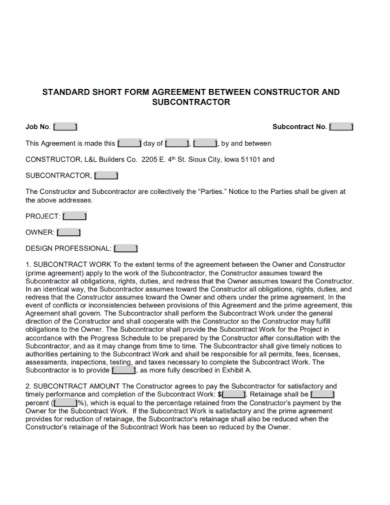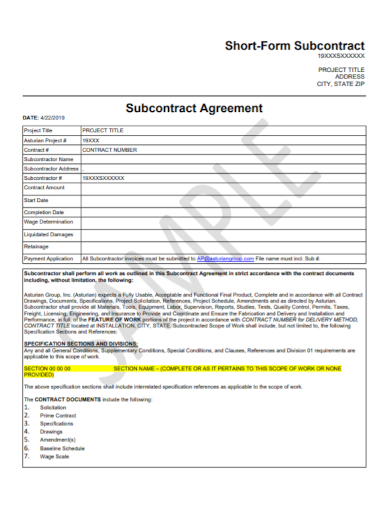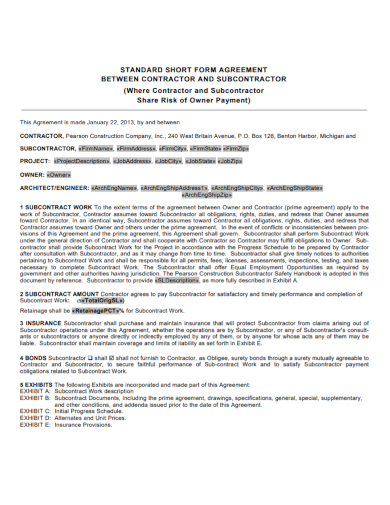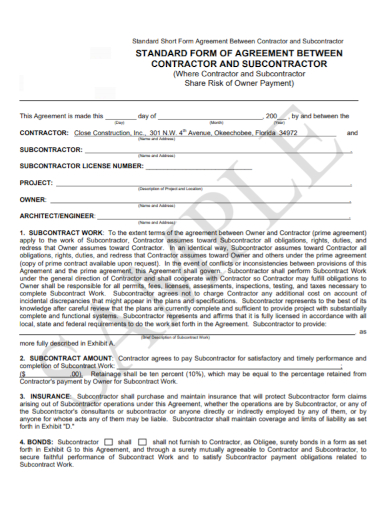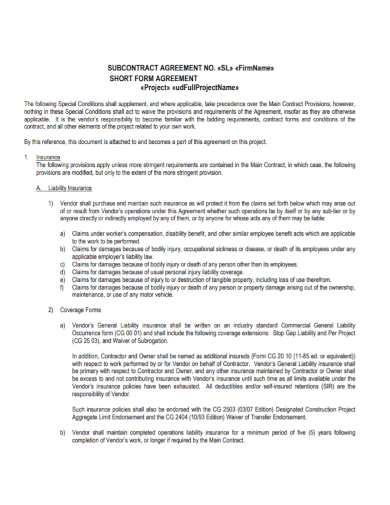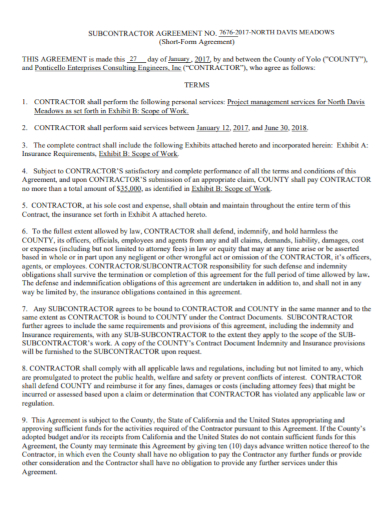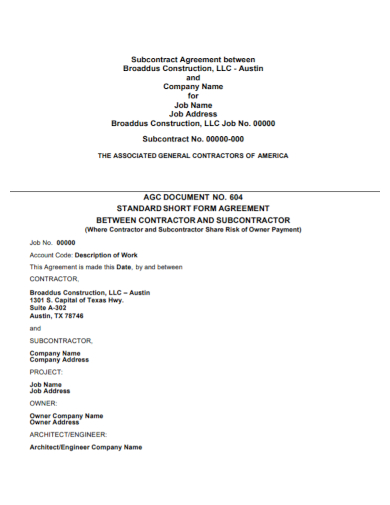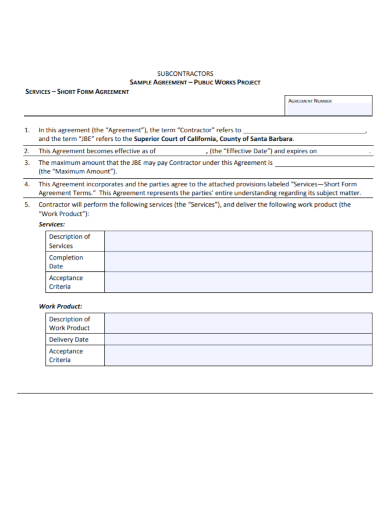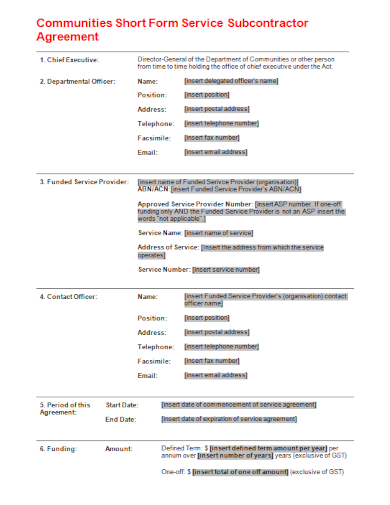Contracts can help you protect your financial and legal rights if you hire a subcontractor. Hiring subcontractors to do a piece of another’s work is a widespread practice. A graphic designer, for example, might employ a writer to produce text for a brochure they’re putting together. A subcontractor can work for almost any type of company or profession. A contract can be used to explain and clarify all of your agreement’s terms and conditions, such as the assignment’s scope, deadlines, and payment arrangements, among other things.
Although a subcontractor agreement may appear to be a method for contractors to protect themselves rather than subcontractors, it might, in some instances, benefit subcontractors rather than contractors. This official written document specifies the work to be done, the schedule, and any other crucial elements that must be considered during the construction process. Subcontractors can protect themselves by being aware of all of these elements, which will enable them to demonstrate what the contractor or owner anticipated them to accomplish. Subcontractors can avoid some of the more detrimental restrictions in their subcontractor agreements by carefully reviewing their subcontractor agreements and refusing to accept unnecessary risk in their subcontractor agreements. In addition, the subcontractor agreement allows subcontractors to exercise their rights and improve the efficiency of their businesses’ operations. To help you get started, we’ve included some sample sales subcontractor agreements that you may use as a template before developing your own. After you’ve familiarized yourself with the document, feel free to use these samples as recommendations or even templates to help you with the full writing process, including how it appears and performs.
8+ Short Form Subcontractor Agreement Samples
1. Short Form Subcontractor Agreement
2. Short Form Subcontractor Project Agreement
3. Standard Short Form Subcontractor Agreement
4. Short Form Contractor and Subcontractor Agreement
5. Short Form Company Subcontractor Agreement
6. Short Form Subcontractor Consulting Agreement
7. Short Form Construction Subcontractor Agreement
8. Short Form Subcontractor Services Agreement
9. Community Short Form Subcontractor Agreement
What Is a Short Form Subcontractor Agreement?
In the construction industry, a subcontractor agreement is a contract between a contractor or project manager and a subcontractor. This demonstrates that both sides have reached an agreement and that the assignment will be completed. To avoid undue risk, subcontractors should thoroughly review the subcontractor agreement and ensure that all requirements are met. The specific duration, scope of work, communication channels, and even payment terms for the project are all detailed in numerous subcontractor agreements. Certain agreements utilize the terms “pay when paid” or “pay if paid” to determine when a subcontractor is compensated. On the other hand, other subcontractor agreements are quite fair to both contractors and subcontractors. Subcontractor agreements, depending on the terms of the agreement, may be more beneficial for subcontractors than standard verbal agreements. If a government agency enters into a contract with a large corporation, the large corporation may be responsible for maintaining the government agency’s commercial locations. The large company may subcontract the maintenance of each location to a subcontractor. As a result, the subcontractor provides the maintenance services, and the large firm profits by charging the government department for the maintenance services at a higher rate than the government department originally paid the subcontractor. Individuals, businesses, and non-profit organizations may function as subcontractors.
How To Write a Short Form Subcontractor Agreement
While a subcontractor agreement may appear to benefit contractors rather than subcontractors, it may really benefit subcontractors. This is a formal written document that details the work to be performed, the estimated completion date, and other critical aspects to consider throughout the construction process. By being aware of all of these facts, subcontractors can protect themselves by demonstrating what the contractor or owner was meant to perform. Subcontractors can avoid some of the more onerous provisions in their subcontractor agreements by thoroughly assessing them and declining to incur unnecessary risks. Additionally, subcontractors can use the subcontractor agreement to assert their rights and optimize their business operations. Numerous critical provisions should be included in a subcontractor agreement. Subcontractors should also be aware of a few points. These are the variables that may have an effect on the agreement, either positively or negatively.
- Scope of Work
The scope of work should always be specified in a subcontractor agreement. The responsibilities assigned to a subcontractor are referred to as the scope of work. It can be challenging to negotiate a vast scope of work, and subcontractors may struggle to fulfill deadlines. When a task is not specified explicitly, it is easy to assert that a subcontractor did not offer the project’s required work. As a result, a well-defined scope of work is necessary. - Supply Chain
Another critical consideration in a subcontractor agreement is the risk associated with the supply chain and other operational challenges. The subcontractor’s control over the owner’s supply chain or commodities is not always complete, and in such instances, the subcontractor should not be held liable. On the other hand, certain contracts are designed to transfer risk to subcontractors. Managing supply chain risk can be as straightforward as reading and negotiating the subcontractor agreement. - Defense & Indemnification
The terms “defense” and “indemnification” are frequently used in subcontractor agreements. Numerous contractors include defense and indemnity clauses in their subcontractor agreements. On the other side, these criteria may occasionally put the subcontractor under undue strain. Certain states have enacted legislation to safeguard subcontractors against contract documents that contain unfair indemnity provisions. Additionally, other states have enacted legislation to avoid excessive indemnity. Subcontractors’ subcontractor agreements should include defense and indemnification clauses. - Insurance, Bonds, & Liens
Contracts with subcontractors may include provisions for subcontractor insurance, liens, and bonds. All subcontractors should be advised of the specific insurance and bond requirements for their contract. However, it is feasible that a contractor will stipulate in the subcontractor agreement whether or not a subcontractor may file a lien. In the event of non-payment or late payment, a subcontractor’s power to file a mechanic’s lien is prohibited or severely limited. - Warranty
The work guarantee specified in a subcontractor agreement may vary each project; nonetheless, this is project-specific. This contract provision benefits the contractor, but it may also benefit the subcontractor. If a subcontractor’s work is of high quality and adequately recorded, his or her reputation will be positive. This enables the subcontractor to address any difficulties that arise as a result of a mishap while also preserving their good image. - Arbitration
Subcontractor agreements usually include arbitration clauses. On the other hand, subcontractors are required to pursue any claims through binding arbitration rather than in a court of law. As a result, subcontractors will be unable to seek redress in court for contract issues. This may or may not be an issue depending on your industry, but it is something to consider when employing a subcontractor. - Conditional Payment
Contractual terms requiring conditional payment are becoming more prevalent in subcontractor agreements. Payment arrangements that are conditional on payment include words such as Pay if paid and Pay when paid. The issue with this is that it results in payment delays for subcontractors and, in some cases, non-payment altogether. Subcontractors must be aware of this clause prior to signing their contract; otherwise, they risk losing their work.
FAQs
What are contract documents?
Tender Documents, Designs, Drawings, Specification, Schedule of Quantities and Rates, Letter of Acceptance, and any agreed-upon revisions, if any, as well as any other documents that comprise the tender and acceptance.
Who is responsible for a contractor?
As a result, subcontracts can effectively outsource contractual obligations to a third party. Due to the primary contractor’s continued responsibility for the performance of the primary contract, any subcontractor failure must be borne by the primary contractor.
Does a subcontractor have to give notice?
If you are subcontracting electrical work or fence construction, you must follow the principal contractor’s directions. Two weeks’ notice is customary.
Subcontractor is not synonymous with employee. Subcontractors are self-employed persons that work independently of the contractor and determine how their jobs are completed. It is not always straightforward to distinguish between an employee and a subcontractor. If the subcontractor is considered an employee, the contractor’s obligations alter (such as payment of superannuation contributions). A subcontractor’s legal obligations and entitlements are distinct from those of an employee.
Related Posts
FREE 10+ Trial Agreement Samples In MS Word | Google Docs | Apple Pages | PDF
FREE 9+ Shop Rental Agreement Samples [ Commercial, Lease, Tenancy ]
FREE 10+ Charter Agreement Samples In MS Word | Google Docs | Apple Pages | PDF
FREE 10+ Mentoring Agreement Samples In MS Word | Apple Pages | PDF
FREE 10+ Partner Agreement Samples In MS Word | Google Docs | Apple Pages | PDF
FREE 10+ Individual Agreement Samples In MS Word | Google Docs | Apple Pages | PDF
FREE 10+ Strategic Agreement Samples In MS Word | Google Docs | Apple Pages | PDF
FREE 10+ Equity Agreement Samples In MS Word | Google Docs | Apple Pages | PDF
FREE 10+ Producer Agreement Samples in MS Word | Apple Pages | PDF
FREE 10+ Grant Agreement Samples In MS Word | Apple Pages | PDF
FREE 8+ Meeting Agreement Samples in MS Word | Google Docs | Apple Pages | PDF
FREE 10+ Community Agreement Samples In MS Word | Google Docs | PDF
FREE 8+ Real Estate Option Agreement Samples in MS Word | PDF
FREE 10+ Call Option Agreement Samples In MS Word | PDF
FREE 10+ Advertising Agreement Samples In MS Word | Google Docs | Apple Pages | PDF

